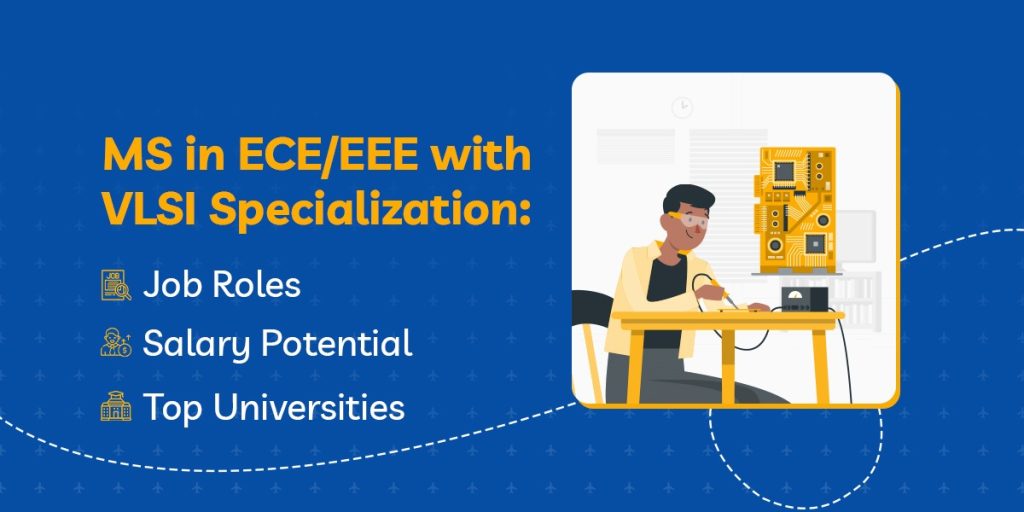MS in ECE/EEE with VLSI Specialization: Job Roles, Salary Potential, and Top Universities

The world of technology is constantly shrinking, and Very-Large-Scale Integration (VLSI) sits at the heart of this miniaturization. From smartphones to supercomputers, VLSI design plays a crucial role in packing ever-increasing functionality onto tiny chips. An MS in Electrical and Computer Engineering (ECE/EEE) with a specialization in VLSI equips you with the skills to be at the forefront of this exciting field. This blog dives deep into the world of VLSI, exploring job roles, salary potential, and top universities offering this specialization.
Why an MS in ECE/EEE with VLSI Specialization?
A Master’s degree in ECE/EEE with a VLSI specialization can be a game-changer for your career. Here’s why:
- High Earning Potential: The average salary for a graduate with a Master’s in VLSI is a compelling $104,000 per year, putting it on par with a Master’s in Data Science. This figure reflects the high demand and specialized skill set required for VLSI engineers.
- Job Security and Growth: The demand for VLSI engineers is on a steady rise, fueled by the ever-growing need for smaller, faster, and more efficient electronic devices. This translates to job security and excellent career prospects in the long run.
- Career Progression: With experience and expertise, VLSI engineers can command salaries exceeding $150,000 annually. The field offers ample opportunities for advancement and leadership roles within the semiconductor industry.
Exciting Job Roles in the World of VLSI
An MS in VLSI opens doors to a multitude of exciting job roles within the semiconductor industry. Here are some key areas:
- VLSI Design Engineer: This is the core role, responsible for the design, development, and testing of integrated circuits (ICs) used in various electronic devices. Your responsibilities involve circuit design, simulation, layout, and verification using specialized software tools.
- Physical Design Engineer: This role focuses on the physical layout of the chip, ensuring efficient placement and routing of components to optimize performance and minimize manufacturing costs.
- Digital Design Engineer: You’ll delve into the logical design of the chip, defining its functionality and behavior using hardware description languages (HDLs) like Verilog or VHDL.
- Verification and Validation Engineer: This role ensures the designed chip functions as intended. You’ll develop test plans, write verification scripts, and utilize specialized tools to identify and rectify any errors before the chip goes into production.
- Application Engineer: You’ll bridge the gap between design and application by helping customers understand and integrate VLSI chips into their products.
These roles offer a diverse and stimulating work environment, pushing the boundaries of technology and innovation.
Top Universities for MS in ECE/EEE with VLSI Specialization
Choosing the right university is crucial for your academic journey. Here’s a breakdown of some top institutions offering VLSI programs, categorized for your reference:
- Tier 1: These universities are renowned for their cutting-edge research and rigorous programs.
- Stanford University
- University of California, Berkeley
- Carnegie Mellon University
- Massachusetts Institute of Technology (MIT)
- California Institute of Technology (Caltech)
- Tier 2: Offering a strong balance between academics and industry relevance, these universities provide excellent VLSI programs.
- North Carolina State University
- Virginia Tech
- University of Texas at Austin
- Arizona State University
- Purdue University
- Tier 3: These universities cater to a broader range of students, offering a solid foundation in VLSI design.
- San Diego State University
- Portland State University
- New Mexico State University
- University of Washington
This list is not exhaustive, and many other universities offer excellent VLSI programs. Consider factors like program curriculum, faculty expertise, research opportunities, location, and cost when making your final decision. Utilize university websites and rankings resources to conduct further research.
Beyond the Classroom: Essential Skills for VLSI Success
A successful career in VLSI requires a strong foundation in theoretical knowledge and practical skills. Here’s what you’ll need to excel:
- Solid understanding of electrical engineering fundamentals: This includes circuit analysis, digital design, semiconductor physics, and computer architecture.
- Proficiency in hardware description languages (HDLs): Mastering Verilog or VHDL is essential for effectively designing and simulating digital circuits.
- Knowledge of Electronic Design Automation (EDA) tools: These software tools are crucial for design, layout, verification, and simulation of VLSI circuits.
- Strong analytical and problem-solving skills: You’ll need to be adept at identifying and troubleshooting complex design issues within VLSI circuits.
- Ability to work effectively in a team environment: Collaboration is key in the semiconductor industry, as multiple engineers contribute to the design and development of a single chip.
- Continuous learning and development: The field of VLSI is constantly evolving, so staying updated with the latest trends and technologies is crucial for long-term success.
Conclusion: Investing in Your Future with a VLSI Specialization
An MS in ECE/EEE with a specialization in VLSI equips you with the knowledge, skills, and experience to thrive in a lucrative and rewarding career path. The high earning potential, job security, and diverse range of job roles make this specialization an attractive option for those passionate about technology and innovation. Carefully consider your academic goals, research universities offering strong VLSI programs, and diligently hone your skills to pave the way for a successful and fulfilling career in the exciting world of VLSI design.
Ready to unlock your potential? Dr. Raju’s Overseas Education Consultants guide students through every step of the university application process. Contact us today
To enroll, Schedule a Free Call with our counselors!

